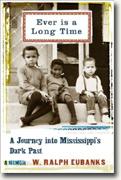Ever Is a Long Time
W. Ralph Eubanks
book reviews:
· general fiction
· chick lit/romance
· sci-fi/fantasy
· graphic novels
· nonfiction
· audio books
· author interviews
· children's books @
curledupkids.com
· DVD reviews @
curledupdvd.com
newsletter
win books
buy online
links
home
for authors
& publishers
for reviewers

 |
Ever Is a Long Time: A Journey into Mississippi's Dark Past: A Memoir W. Ralph Eubanks Basic Books Hardcover 256 pages September 2003 |
|
This book could start a family on a search for its history, or revive significant memories. It bridges gaps that we all have hidden in our hearts; it brings to light facts which are chilling, yet sad in their ordinariness.
Ralph Eubanks grew up in the small town of Mount Olive, Mississippi, and was one of the first children to enter the new, integrated school system: "The culture of manners in Mount Olive prevented any brash displays of racism, but racism hung heavily in the air nevertheless." After years of being encouraged to read, suddenly his reading material was inspected and, in essence, censored -- "the schools and their leadership made it clear that the open exchange of ideas and philosophies would not be tolerated." Eubanks began to look microscopically at his childhood experiences after learning that his parents had been named on a "watch list" put out by the Sovreignty Commission, the body which monitored racial activity in the turmoil of the Civil Rights era. Why had these quiet, intelligent people been singled out? And what were, at that time, the possible implications of being listed? These were the questions for which Eubanks sought answers. In his quest he had the chance to meet men, one a former Klansman, who had wielded life-and-death power over the small farming community and over his own mother and father. It was undeniably true that having one's name on the list could mean that "there are some rednecks out there" who would make trouble for them, as Horace Harned, former self-described "firebrand of the Sovreignty Commission," so succinctly put it, "and there are still some out there." Eubanks had breakfast with Denson Lott, a man who admitted he had been a member of the Klan, for political expediency. Despite the cordial talk of these two men with so much, and so little, in common, Lott declared, "I have nothing to regret." But "I watched Mr Lott walk to his car. He stopped briefly in the parking lot, and I saw that he was crying and wiping tears from his face. I suspected that he really did regret his years in the Klan; he just couldn't bring himself to admit it." There were also informers -- blacks in the pay of the local white establishment -- whose information imperiled the many honest people working diligently behind the scenes for such now innocuous-seeming causes as voter registration. The NAACP was widely considered to be a communist organization, and condeming it was seen as reasonable in the atmosphere of the Cold War. In Mount Olive, it operated as a "benevolent brotherhood" - but the snitches blew that cover and put Eubanks' parents, a school teacher and the Negrao County Extension Agent, on the Sovreignty Commission's targeted list of "niggers, alligators, apes, coons, possums," as an old Mississippi joke went regarding the constituents of the NAACP. Eubanks also talked to Ed King, a white Methodist minister who marched with Medgar Evers and who "had been washed in the blood of the Civil Rights movement" and bears scars from its beatings. King attempted, unsuccessfully, to keep the findings of the Sovreignty Commission private to protect individual rights. In that he differed with Eubanks, but agreed with him that "great good has come about since they have been opened." In King, Eubanks sees a real hero who "could have stayed away...he chose to stand on the front lines, albeit in the background lest he be accused of being a white man who wanted to tell the black people the best way to gain their freedom." For young people who have never "been there," this book is revealing of the times. Eubanks was just a kid who happened to grow up in the midst of an evil era out of which much good has come. Taking both together can forge a wholeness, in a man, and in a people.
|
|
|
|
 Click here to learn more about this month's sponsor! |
|
| fiction · sf/f · comic books · nonfiction · audio newsletter · free book contest · buy books online review index · links · · authors & publishers reviewers |
|
| site by ELBO Computing Resources, Inc. | |
 Ever Is a Long Time is the memoir of a man who was pulled by degrees into a
rediscovery of his past and the buried, unsavory history of a generation -
Mississippi's white and black communities caught in a moment in time when
violence, secrecy, fear and courage stalked the land.
Ever Is a Long Time is the memoir of a man who was pulled by degrees into a
rediscovery of his past and the buried, unsavory history of a generation -
Mississippi's white and black communities caught in a moment in time when
violence, secrecy, fear and courage stalked the land.